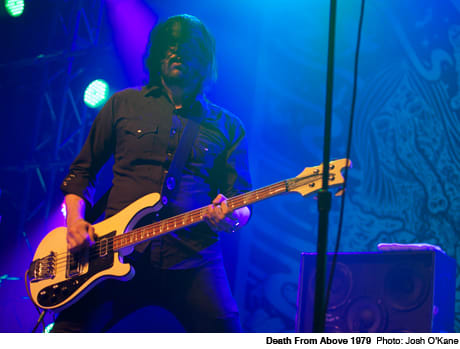James Murphy once sang of kids' "borrowed nostalgia from the unremembered '80s." That was in 2002. In 2004, Murphy's label DFA allegedly approached Toronto duo Death From Above and asked them to change their name to avoid confusion. The band tacked 1979 onto the end, and a grudge was born -- at least until the group broke up in 2006. While their five-year career as Death From Above 1979 took them across the world, DFA1979 never gained the fame the group deserved, and they were certainly missed.
Today, Murphy's words make eerie sense when applied to the band he once cursed with four extra digits: DFA1979's fanbase has expanded exponentially after their breakup, with new followers fighting just as hard as original fans to catch a glimpse of the fuzz-laden dance-punk duo since Sebastien Grainger and Jesse Keeler reunited earlier this year. Yet many are too young to know group's original impact, and the nostalgia is most definitely borrowed.
After playing sold-out festivals all summer long, the duo finally gave a hometown show, the first of a pair, at Toronto's Sound Academy. A track-by-track synopsis would be futile for Death From Above 1979; there are no surprises. Their live performance explodes with fuzz and screams, just as their first EP Heads Up and sole LP You're a Woman, I'm a Machine promised a generation of fans who never got to see them live. They are a band to see for the sake of seeing, to cash in on the borrowed nostalgia and the latent love that fuelled so many public cries for Keeler and Grainger to reunite.
There were few differences between this set and their broadcasted return at this year's Coachella music festival, but there's little need to expect more. The band delivered, consistently executing the thundering racket that defined their sound. Keeler and Grainger tore through hits like "Black History Month," "Go Home, Get Down" and "Romantic Rights," plus rarities including "You're Lovely (But You've Got Problems)." Anything resembling new material was restricted to bridges in between songs -- some soft and melodic, others simply screeching synth loops.
If anything symbolized the differences that put the duo on a five-year hiatus, it was their garb. While Keeler was clothed in black, Grainger was in all white, to the point where his black locks have been bleached blond.
Fans' thirst may have finally been quenched, but barely for the length of the show. The traditional cries of "One more song" were quickly usurped by a more poignant cry: "One more album!" After a first taste, nostalgia may no longer be enough.
Grainger acknowledged all of this new love. "There are more people here than we ever played for the first time," he told the crowd during the encore. "We never thought it would happen."
Today, Murphy's words make eerie sense when applied to the band he once cursed with four extra digits: DFA1979's fanbase has expanded exponentially after their breakup, with new followers fighting just as hard as original fans to catch a glimpse of the fuzz-laden dance-punk duo since Sebastien Grainger and Jesse Keeler reunited earlier this year. Yet many are too young to know group's original impact, and the nostalgia is most definitely borrowed.
After playing sold-out festivals all summer long, the duo finally gave a hometown show, the first of a pair, at Toronto's Sound Academy. A track-by-track synopsis would be futile for Death From Above 1979; there are no surprises. Their live performance explodes with fuzz and screams, just as their first EP Heads Up and sole LP You're a Woman, I'm a Machine promised a generation of fans who never got to see them live. They are a band to see for the sake of seeing, to cash in on the borrowed nostalgia and the latent love that fuelled so many public cries for Keeler and Grainger to reunite.
There were few differences between this set and their broadcasted return at this year's Coachella music festival, but there's little need to expect more. The band delivered, consistently executing the thundering racket that defined their sound. Keeler and Grainger tore through hits like "Black History Month," "Go Home, Get Down" and "Romantic Rights," plus rarities including "You're Lovely (But You've Got Problems)." Anything resembling new material was restricted to bridges in between songs -- some soft and melodic, others simply screeching synth loops.
If anything symbolized the differences that put the duo on a five-year hiatus, it was their garb. While Keeler was clothed in black, Grainger was in all white, to the point where his black locks have been bleached blond.
Fans' thirst may have finally been quenched, but barely for the length of the show. The traditional cries of "One more song" were quickly usurped by a more poignant cry: "One more album!" After a first taste, nostalgia may no longer be enough.
Grainger acknowledged all of this new love. "There are more people here than we ever played for the first time," he told the crowd during the encore. "We never thought it would happen."
